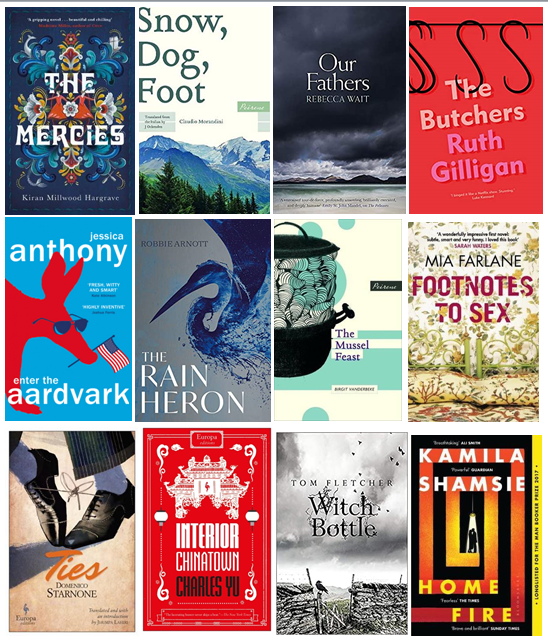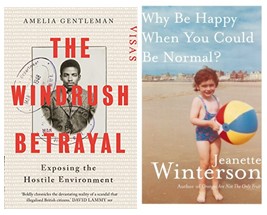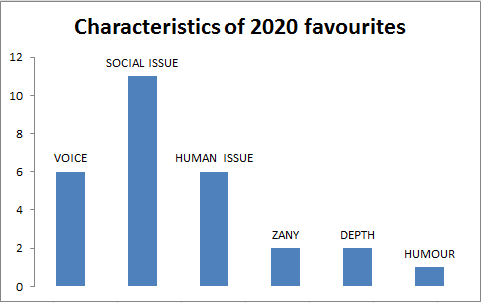| Proof, if proof were needed, we are living through strange times: I’ve selected two non-fiction books among this year’s favourite reads. But fiction still gets preferential treatment on Annethology… or could it be I’m saving the best for later? I hope you’ll browse through my choices, the novels listed in the order I read them, and let me know if any chime with yours. |
Snow, Dog, Foot by Claudio Morandini, translated from the Italian by J Ockenden and published by Peirene Press, is a beautifully compassionate story of an old man estranged from society gradually becoming estranged from himself. Whether due to dementia, psychosis or social isolation, the author perfectly encapsulates how his attempts to safeguard his shreds of sanity pitch him deeper into the muddled maelstrom of his mind.
Our Fathers by Rebecca Wait, published by riverrun, is a quietly potent and psychologically astute novel about a shocking crime which honestly addresses toxic masculinity, coercive control, survivor guilt and our collective willingness to turn a blind eye to our friends’ and family members’ misdeeds.
Also about masculinity, The Butchers, by Ruth Gilligan and published by Atlantic books, is a beautifully written and compassionate story of four characters adapting to major change in their personal lives while their native Ireland catapults into the twenty-first century, wrapped up in a mystery involving a disturbing photograph.
Cleverly plotted, beautifully written (unless you object to a second-person narrative) and unashamedly political, Enter the Aardvark by Jessica Anthony, published in the UK by Doubleday, is a trenchantly honest yet uplifting tale of populist politics, closet (literally in one case) homosexuality and wearing the skins of your enemy to get what you need.
Published by Atlantic Books, Robbie Arnott’s beautifully brutal eco-fable, The Rain Heron, is about fragile people wreaking havoc on each other and on our fragile planet, feels nevertheless hopeful and redemptive.
In The Mussel Feast by Birgit Vanderbeke, translated from the German by Jamie Bulloch and published by Peirene Press, the cracks in the facade of a superficially happy family are gradually revealed as a teenage girl waits, along with her mother and brother, for her tyrannical father’s return.
Footnotes to Sex by Mia Farlane, published by Penguin in 2009, is a poignantly comic novel about fandom, procrastination, the silence that speaks volumes in many long-term couplings, and the pain of lacking the confidence to know what you want.
Ties by Domenico Starnone, translated from the Italian by Jhumpa Lahiri and published by Europa Editions, is a clever dissection of a family damaged by the father’s infidelity, the scalpel cutting deeper as the narrative progresses through three points of view.
Interior Chinatown by Charles Yu, published by Europa editions, is a playful novel, set out like a screenplay, raising serious issues about identity, stereotypes and cinema, and the invisibility of people of Asian origin in the narrative of the American dream.
Witch Bottle by Tom Fletcher, published by Jo Fletcher Books, is a literary horror novel set in rural Cumbria about a man whose childhood trauma has left him in terror of his repressed potential for violence.
Home Fire by Kamila Shamsie is a politically and psychologically astute novel about moral ambiguities presented by the consequences of the “war on terror” from the perspective of a British Muslim family with roots in Pakistan.
| And so to my two non-fiction choices: The Windrush Betrayal by Amelia Gentleman is a compassionate investigation into how the British government’s austerity measures and ‘hostile environment’ policy resulted in thousands of Caribbean-born British citizens being misclassified as illegal immigrants and stripped of their rights. |
























 RSS Feed
RSS Feed





















